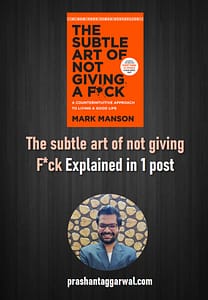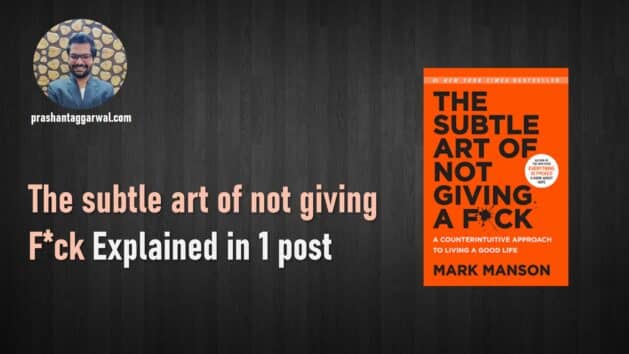Mark Manson – About the Author

Mark Manson is an American self-help author who became hugely popular and gained hundreds of thousands of readers. In 2010, he started a blog called Post Masculine which provided general life advice for men. On this blog, he posted an article under the same name as this book, and this article was so well received that he decided to turn it into a book i.e. The Subtle Art of Not Giving a FUCK which went on to become a New York Times bestseller.
The Subtle Art of Not Giving a Fuck
The Subtle Art of Not Giving a FUCK is designed to clarify what you should choose to find important in your life. We don’t realize how frequently we’re giving importance to something that doesn’t even matter. The author tries to help you to start focussing and giving fuck about the things that really matter.
Key Learnings from the Book
1. Stop Pursuing Satisfaction
This approach is very different from typical modern society’s expectations of how we can become happier, richer, and more successful by merely wanting it. But in reality, True happiness is just caring about what matters the most.
There is something called the “The Backwards Law” which was introduced by the British philosopher Alan Watts. As per this law the more you pursue feeling better, the less satisfied you become. Constantly running behind satisfaction will reinforce that you lack it in the first place. Essentially…
- The pursuit of a positive experience is a negative experience in itself.
- The acceptance of a negative experience is itself a positive experience.
Essentially, you can create positive experiences through the tolerance of negative experiences.
2. Stop Beliving That You Are Unique
Modern society is obsessed with the idea that we are all unique. This idea has created a society of people who expect everything to go right all the time. Entitlement is feeling you deserve to be happy without sacrificing for it. There are two types of entitlements:
- Grandiose narcissism: I’m awesome and the rest of you all suck, so I deserve special treatment.
- Victim narcissism: I suck and the rest of you are all awesome, so I deserve special treatment.
Both of these types end up the same as they behave in the same way. Both these types are deluded about where they lie in the social hierarchy and both think everything should be catered to benefit them. This means they are completely self-absorbed.
3. Accept Reality As It Is
Take responsibility for the emotions and understand that handling negative emotions is an everyday struggle. Problems never stop occurring; they just change. Hence, we should aim to solve problems in our lives than avoid them. We should not aim for a life without problems but a life filled with good and interesting problems.
4. Happiness Is a Science
The values of humans are hypotheses, the actions are experiments and the outcomes are data. So, one should make smart decisions based on results rather than doubt, fear, and uncertainty. Uncertainty is a vital rung in the way to success, and one shouldn’t fear it. Uncertainty pushes us to learn more and helps us understand that our values are imperfect, and it guards us against extremist ideology. It also helps remove the judgment and stereotyping of other people.
5. Values Are The Key For Happiness
Your deepest emotions are related to your values and the values you fight for determining who you are. Good values are critical for your happiness, but we often focus on bad values. Chasing empty pleasures and believing you are always right is an example of bad values. Good values are based on reality, internally achieved, and socially constructive.
6. Take Responsibility
The decision to take responsibility for your own problems will allow you to direct all your energy to improve your life. Which will in turn help in improving millions of other people’s lives. When you take responsibility for a problem, you take responsibility for how you feel about that problem.
7. Choose How You Respond to Life
We cannot choose what happens in our lives or the outcome of our decisions. But, we have complete control over how we respond to a problem or failure emotionally. Taking responsibility for our reactions to negative situations helps us better deal with problems.
8. Doubt Your Beliefs
Doubting ourselves and our actions helps us to improve over time. We won’t always be right. Historically, People believed the Earth was flat. In the same way, you can look back at what you believed 10 or 15 years ago and realize that you were wrong again about several things. Some of the things that you hold to be true currently will likely be wrong and even ridiculous in the next 20 or 30 years’ time.
9. Reduce Your Ego In Order to Grow
The more something threatens your identity, the more you would avoid it. Hence, to reduce this level of avoidance, we should reduce our sense of identity and ego. We must identify ourselves as loosely and ambiguous as possible. To start identifying yourself more loosely, you should start asking yourself below mentioned three questions:
- What if I’m wrong?
- What would it mean if I were wrong?
- Is Will being wrong to create better or worse problems than my current problem?
10. Failure Is Key to Improvement
Failure is a very important part of life. Becoming an expert in any field requires many failures. These failures help you to fine-tune your approach via continuous improvement. This is the reason why the fear of failure leads to stagnation.
Instead of worrying when failure happens, we should try again.
11. It is Better to Do Something Than Nothing
Rewriting the problem helps your mind to find the next step. If you are stuck, then just do something and you will definitely surprise yourself. Instead of looking for motivation that leads into action, this “do something principle” argues that action leads to motivation.
12. If you want to say Yes, learn to say No.
To truly stand, for one thing, you must first learn to reject another thing. Being open towards everything thrown at you will mean you spread yourself too thin. It is more joyful choosing one pursuit and consistently sticking to bettering yourself. You also cannot enjoy something if you don’t reject the alternatives.
In Nutshell
The three subtleties that describe the art of not giving a fuck are:
- Not giving a fuck doesn’t mean that you have to be indifferent; it means to be comfortable being different.
- For Not giving a fuck about adversity, you must first give a fuck about something more important than adversity.
- Whether you realize it or not, you have been choosing what to give a fuck about in your life.
If you found my post helpful, then do share it with your friends and colleagues. If you have any feedback/questions, you may leave a comment below.

